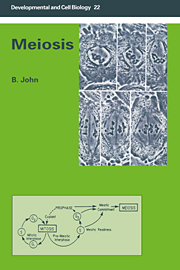Book contents
- Frontmatter
- Contents
- Acknowledgements
- Prologue
- 1 Introduction – multiplication and division
- 2 Modes of meiosis
- 3 Occurrence and timing of meiosis
- 4 Events and mechanisms of meiosis
- 5 Chromosome disjunction
- 6 The genetic control of meiosis
- 7 Sequences and consequences of meiosis
- 8 Evolutionary aspects of meiosis
- Postlogue
- References
- Index
7 - Sequences and consequences of meiosis
Published online by Cambridge University Press: 21 January 2010
- Frontmatter
- Contents
- Acknowledgements
- Prologue
- 1 Introduction – multiplication and division
- 2 Modes of meiosis
- 3 Occurrence and timing of meiosis
- 4 Events and mechanisms of meiosis
- 5 Chromosome disjunction
- 6 The genetic control of meiosis
- 7 Sequences and consequences of meiosis
- 8 Evolutionary aspects of meiosis
- Postlogue
- References
- Index
Summary
Logic is the art of going wrong with confidence
AnonTWO-TRACK HEREDITY
That differences exist between the two sexes within a given species in respect of sex chromosome behaviour has long been recognized. This is most obvious in XO, or ZO, systems. Here, genes carried by the X- or Z-chromosome pass unrecombined through the heterogametic sex because of the lack of a homologous partner. The same is also true for many, in some cases probably all, of the genes in the X- or Z-chromosomes of XY, or ZW, systems, respectively, since here too the X or Z is paired with a Y or W with which at best it has only partial homology (see Chapter 4C.6).
Differences of this kind are, of course, expected and easily explained. What is surprising, however, is that the autosomes may also behave differentially in the two sexes in respect of their meiotic behaviour.
Sex differences in recombination
In a majority of species, meiosis is without doubt chiasmate in both sexes. In most of these, no detailed analysis has been undertaken of either chiasma frequency or chiasma distribution. In a growing number of cases where both sexes within a given species have been analysed meiotically there are significant differences between them in respect of the occurrence,the frequency or else the distribution of chiasmata within the autosomal sets (Table 7.1). The most overt examples concern species where meiosis is achiasmate in one sex but chiasmate in the other. No less impressive are those cases, like the grasshopper Stethophyma grossum (Perry & Jones, 1974), where chiasmata are proximally localized in one sex and distally localized in the other.
- Type
- Chapter
- Information
- Meiosis , pp. 271 - 303Publisher: Cambridge University PressPrint publication year: 1990

